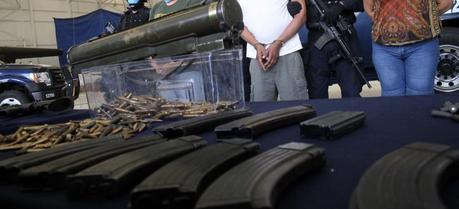 Mexico’s organized crime expanded from drug smuggling and arms trade to the theft of crude oil, gas and gasoline. (Credit: Flickr @ Jesús Villaseca Pérez https://www.flickr.com/photos/frecuenciaspopulares/)
Mexico’s organized crime expanded from drug smuggling and arms trade to the theft of crude oil, gas and gasoline. (Credit: Flickr @ Jesús Villaseca Pérez https://www.flickr.com/photos/frecuenciaspopulares/)Mexico’s budding energy reform is being threatened by organized criminal groups and requires focused action by the Mexican government, according to Tony Payan, a fellow for Mexico studies at Rice University’s Baker Institute for Public Policy and director of the Baker Institute’s Mexico Center.
Payan outlined his insights in a new issue brief, “Energy Reform and Security in Northeastern Mexico,” co-authored with Guadalupe Correa-Cabrera, an associate professor and chair of the University of Texas at Brownsville’s Government Department.
In December 2013, Mexico’s Congress approved constitutional changes that opened the country’s energy sector to private and foreign investment for the first time since the late 1930s. The Mexican public has been promised that this energy reform will lead to a more robust economy, lower energy costs and more and higher-paying jobs.
“Looming in the background of this rosy scenario, however, are organized criminal groups that prey on Mexico’s oil industry and control much of the infrastructure of the country’s Northern Economic Corridor,” Payan said.
He said Mexico’s organized crime groups have expanded from drug smuggling to areas that include theft of crude oil, gas and gasoline, a practice known as “bunkering”—milking pipelines and transportation trucks.
“The Mexican government must strengthen all of its justice institutions and re-establish law enforcement credibility to provide not only legal certainty but also assurances to private and foreign investors that their capital is protected,” Payan said. “The government must also be transparent about the dimensions of criminal activity in the region and work with investors to address the problem. The main areas of focus should be police reform and the fight against corruption.”
In addition to being a Baker Institute fellow, Payan is an associate professor of political science at the University of Texas at El Paso and serves on the graduate faculty of the Universidad Autónoma de Juárez in Ciudad Juárez, Mexico. His area of study is international relations, with an emphasis on U.S. and Mexican foreign policy and U.S.-Mexico relations. He is the author of “The Three U.S.-Mexico Border Wars: Drugs, Immigration and Homeland Security” and other books.

